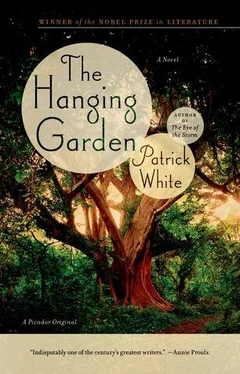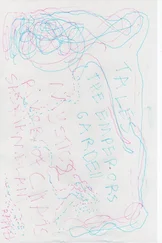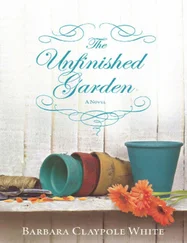Patrick White
The Hanging Garden
The Hanging Garden has been transcribed from Patrick White’s handwritten manuscript and, in the absence of a living author to consult, not edited.
Mamma had been taken into the saloni . She was sitting talking to the Englishwoman.
‘You’ll find her a quiet, reasonable child.’
It made the reasonable child feel grave, important, while remaining unconvinced.
She was standing in a smaller room which opened off the important one where callers are received. It was a house of many rooms, whether their purpose was reasonable or not she hadn’t had time to find out, but sensed that she might approve of the house, dark and quiet, standing on the edge of this precipice.
She looked down through the closed window, through the leaves of dark yet glossy trees growing out of a wall of rock above the shining water of a small, private-seeming bay. More than anything the water consoled, its light that of the Gulf. She half-expected that if the curtain were to lift she would catch sight of the volcano on the island opposite. But the leaves were unmoved. She was reminded of the trees in the Royal Garden. As she ran past the benches with their officers and girls she heard her feet crunch on the gravel, running through the cool towards the muddy smell of ducks.
‘I’m sure she won’t give you any trouble,’ (Mamma was saying in the saloni .)
‘Oh dear no, I can see, Mrs — er — Sklavos’ carefully, ‘I can see she is quite the grown-up little lady.’
Suddenly Mamma burst into tears, through her crying the sound of furniture a rusty stirring and another sort of motion which must have been this Englishwoman’s, she had the figure of a dressmaker’s dummy.
‘It must be a comfort to know she will be on British soil.’
Mamma could have been mopping her tears. ‘But we are not British, Mrs Bulpit. Eirene is a Greek.’ How strange it was to hear Mamma’s voice, as though feeling its way into a foreign language. ‘My husband was a Greek — a Greek patriot. And I was Australian before I married. I do not think of myself as British.’
For a moment Mamma’s voice made Eirene feel foreign, when she had never thought of herself as being anything at all.
It became interesting. She supposed she ought to go into the room, and hang around, be with Mamma, even if she didn’t show herself. Her future guardian made her feel shy.
Mrs Bulpit was sucking her teeth. ‘… Can’t expect me not to feel English … English-born … husband too. Reg came to Australia on leave … a W/O in the Indian Army … took a fancy … decided to settle … sick of blacks…’
The child realised the woman was looking sideways at her, but vaguely, as though considering in the depths of her mind, whether this child was black too. So the child, who had never considered her complexion till now, sidled partially from view behind the padding of one of the rusty chairs. From above a scroll where greasy heads had rested her eyes could still take stock.
Mrs Bulpit was a pale woman except where the mouth had been painted over. Her forearms, hands, and face could have been moulded from natural marzipan. The lips shone with crimson grease rising to a little bow, they matched the nails in the marzipan hands, one of them lying in a black lap, the other dangling from a sofa arm the colour of age and dust. More than anything, more than the crimson trimmings of her face and fingers, the colour of her hair made Mrs Bulpit noticeable, the little curls with which her head was arranged were of a rich red such as you see in a windowful of new furniture. The curls had a varnished look and though they might have been freshly done they gave no life to Mrs Bulpit’s flesh, they only emphasised its dead pallor.
Mamma blew her nose. ‘If you have any queries there is my cousin Mrs Lockhart.’
She had almost eaten off the stuff she had put on her lips for arrival. Nothing to compare with the paint Mrs Bulpit used, Mamma’s lips looked blenched and bitten.
‘You may wonder,’ she said in the foreign-sounding English she had begun using in this house, ‘why my cousin does not take Eirene. Too many of her own. — Then too, Alison is one of those who does not care for additional responsibility.’
‘Nobody can say,’ Mrs Bulpit was saying, ‘that I haven’t a highly developed sense of responsibility.’
‘I also thought Eirene, an only child, might feel oppressed in a large family.’
‘That is correct. An only child. One myself. And she’ll have her playmate. Another little refugee. He ought to be in presently. Why he isn’t? One I told you of … English boy…’
Perhaps remembering something, Mrs Bulpit withdrew the hand hanging from the sofa arm and plaited it with the one lying in her lap, as though preparing to protect herself against something Mamma might do or say. At the same time what sounded like a wheeze rustled out of the plastic bust of the dressmaker’s dummy.
‘Nobody is wholly responsible for what they are.’ Mamma’s voice sounded tired and dull.
Mrs Bulpit sat contemplating this remark. She was at a temporary loss.
While the child’s loss felt permanent she wondered whether to stay in the room or leave it for one of the many others, or the now forbidding precipice outside. Though relieved to have avoided the family of Lockhart cousins, she dreaded her meeting with this boy, probably lurking and listening, the other side of a none too solid wall as she was lurking and listening inside her solitary body. Mamma’s eaten lips and adoption of a foreign sounding accent showed her she could expect nothing from that direction. If only Papa. But Papa was dead.
‘You’ll have to admit when you meet him he’s a handsome little lad, Mrs — Sklavos. Blue eyes. And the loveliest hair — pale gold…’
Papa’s eyes were almost black. They crackled with fire when he talked about what he saw as the future. Now the future was a shapeless dread in what was a stockstill present.
She ended up leaving the saloni . The darkening house extending behind it was preferable.
* * *
He had spent most of the afternoon pitching stones into the water. The glare no longer made him squint. Salt scales had replaced the scurf of his own skin on legs and arms, now the colour of Arnott’s Milk Arrowroot. (‘Most Australian kiddies love these biscuits, and I expect you will too Gilbert.’ He agreed they were — beaut, carefully.) He licked the scales off his left forearm before pitching his last stone. As afternoon faded, long brassy fingers of light extended from the direction of the city. They reached out at him, but fell short, distorted by ripples in mauve-green water inserting themselves in cracks of the gull-scribbled sea wall. A gull on the long slow curve of its flight let fall a squeeze of white almost like toothpaste on the pale hair. By now so dazed by sun, air, dreaming, he barely bothered.
He supposed he ought to go up, or the old girl would start yelling for him. ‘Gilbert? Gilbert !’ It got on his tits since he had started answering to ‘Gil’. And now this girl. He had heard a car arriving at the house above. Car doors. Too far for voices to carry. But he shivered for the sound of the foreign voice he hadn’t heard.
The bombs he hadn’t heard, but knew about, exploded in his sleep. Nigel is gone, they told him, they wouldn’t say dead. And Aunt Gemma. And the woman at the grocer’s on the corner flipping the evening paper into a cornet, pink gums smiling too shiny false. You could believe in the deaths of older people, but not of Nigel, any more than yourself could die. It was too soon. He could not have told: my friend died, any more than I Gilbert Horsfall am dead.
Читать дальше












